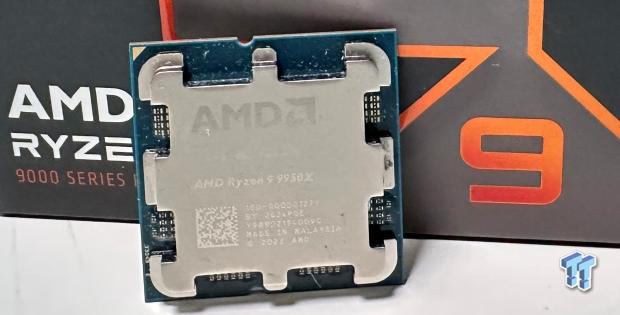
The Bottom Line
Pros
- Use the same AM5 socket
- DDR5 support at 8000MHz
- Solid power efficiency at 120w TDP
- Lower entry cost over the last generation
- Added integrated Radeon GPU
Cons
- Gaming performance could be better
Should you buy it?
AvoidConsiderShortlistBuyIntroduction, Specifications, and Pricing
Nearly two years out from our review of the Ryzen 9 7900X, AMD has come to market with "Zen 5," which, like previous generations, initially encompasses four SKUs, three of which we have recently published reviews on here at TweakTown. The Ryzen 9 9900X, the model we will focus on for this review, lives at the higher end of the product stack and competes directly with Intel's Core i7 14700K and 14900K at this point and likely Core Ultra 200 series Arrow Lake offerings when they launch later this year.
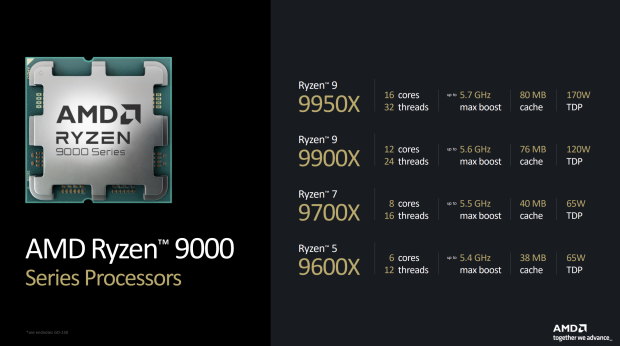
Specifications for this CPU give us a twelve-core, twenty-four-thread CPU built on the newly minted 4nm process from TSMC. Clocks come in at 4.4GHz for the base on the 9900X, while boost can hit upwards of 5.6GHz on a reduced 120W TDP. Memory support includes DDR5, the JEDEC standard being 5600MHz for Zen 5, and, of course, the 9900X enjoys the addition of Radeon Graphics like all Zen 5 SKUs.
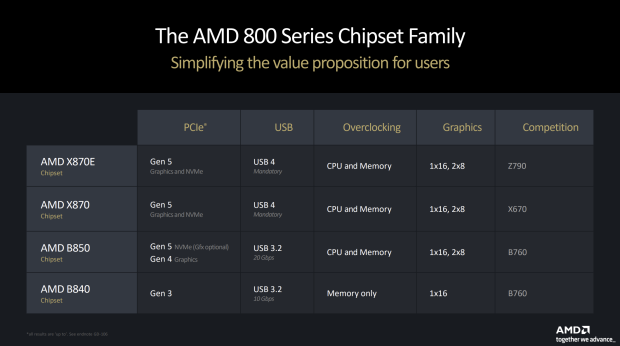
Along with the Zen 5 product stack launch, motherboard vendors are preparing new motherboards with enhanced chipsets that take advantage of a higher ability to overclock memory, AMD saying upwards of 8000MHz+.
These chipsets include the X870E, which takes on Intel's Z790 in the current market, while the AMD X870 is set to replace the X670 directly, and two budget chipsets, B850 and B840, can offer low-cost entry into Zen 5 offerings. With that, each of these chipsets has mandatory connection options, with both X870 chipsets coming with USB4 at minimum, along with a Gen 5 PCIe for both your 1x16 or 2x8 slot configuration and NVMe slot.
B series chipsets get USB 3.2 connectivity and a mix of Gen 5 NVMe with Gen 4 GPU, or we have the B840, which is Gen 3 across the board. CPU and memory overclocking is available across both X870 offerings and the B850 chipset; the B840 is dumbed down even more with basic overclocking options for memory only.
As for pricing, the AMD Ryzen 9 9900X carries an MSRP of $499.

| Today | 7 days ago | 30 days ago | ||
|---|---|---|---|---|
| $375.99 USD | $405.29 USD | |||
| - | $405.29 USD | |||
| $599.99 CAD | $599.99 CAD | |||
| $599 CAD | $599 CAD | |||
| £405.30 | £399.98 | |||
| $375.99 USD | $405.29 USD | |||
|
* Prices last scanned on 3/6/2025 at 4:22 pm CST - prices may not be accurate, click links above for the latest price. We may earn an affiliate commission from any sales.
|
||||
Packaging and Test System
Packaging and Accessories
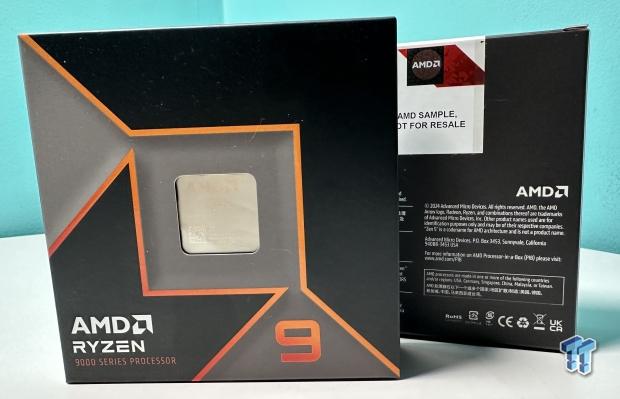
The 9900X and its brother Ryzen 9 counterpart were delivered together in retail packaging.
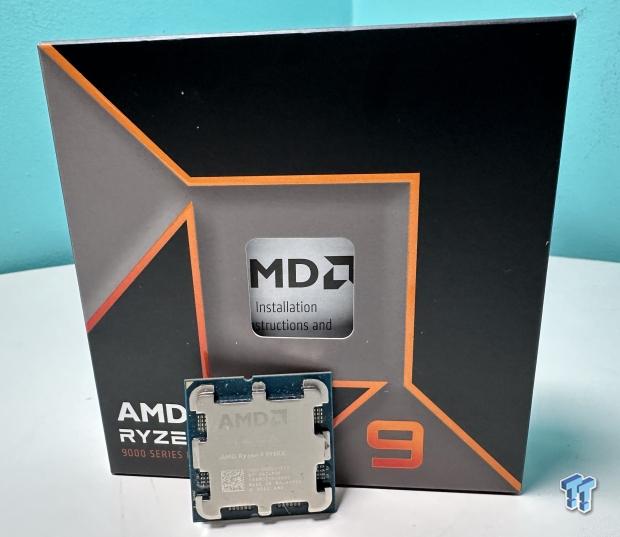
Above is a better look at the CPU packaging and the CPU removed from the retainer.
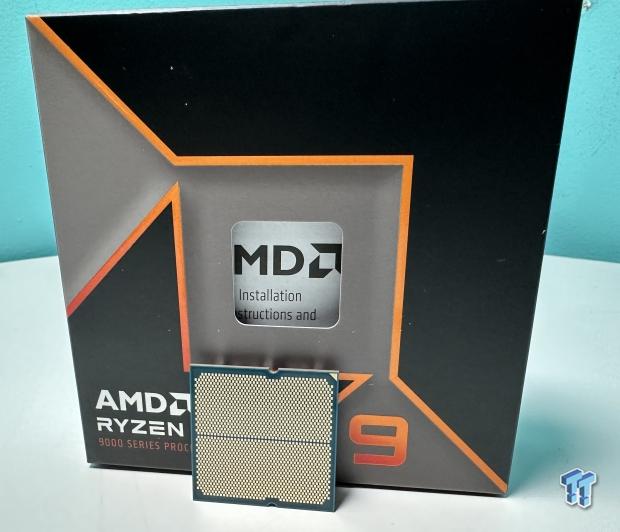
Looking closer at the CPU, the backside offers the 1851 pads that connect it to the motherboard.
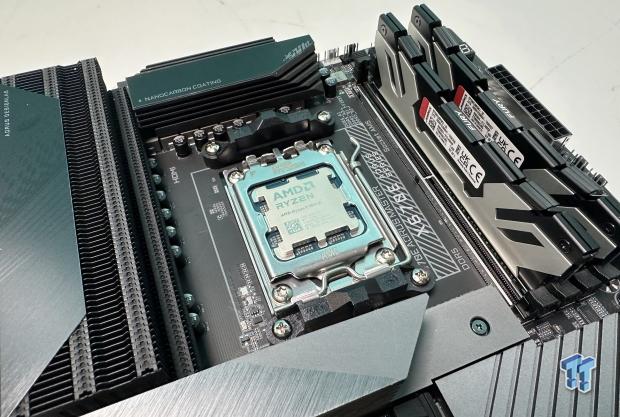
To test the 9900X and even the 9900X, we pulled out our X670E AORUS Master and populated it with a Kingston Fury kit at 7600MHz.
AMD CPU Test System
- Motherboard: GIGABYTE AORUS X670E Master - Buy from Amazon
- GPU: NVIDIA RTX 4070 Ti - Buy from Amazon
- RAM: Kingston Fury 7600MHz - Buy from Amazon
- Cooler: EKWB Nucleus 240 - Buy from Amazon
- OS Storage: Crucial T705 2TB - Buy from Amazon
- Power Supply: Corsair HX1500i - Buy from Amazon
- OS: Microsoft Windows 11 Pro - Buy from Amazon
Cinebench 2024, AIDA64 and CrossMark
Cinebench 2024
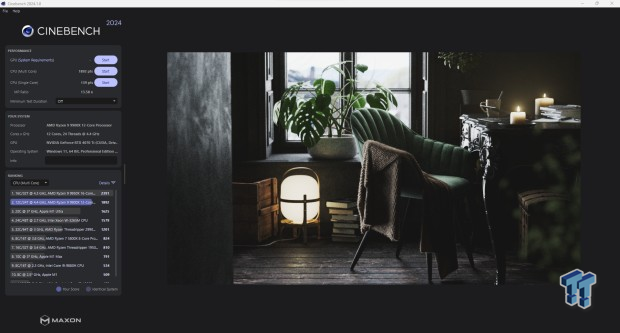
Like the 9950X review, we started with raw data, with some comparisons to come later. To get a baseline performance for the 9900X, we pushed through R24. Single-core came in at 139, while multi-core landed at 1892.
CrossMark
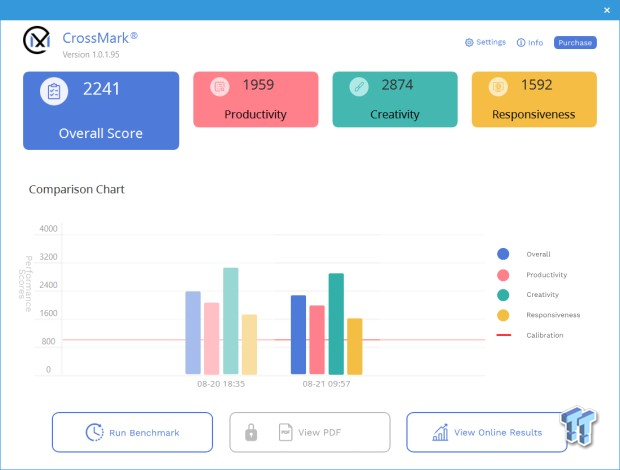
Crossmark scored 2241 overall, with creativity being our strongest workload on the 9900X.
AIDA64 Memory
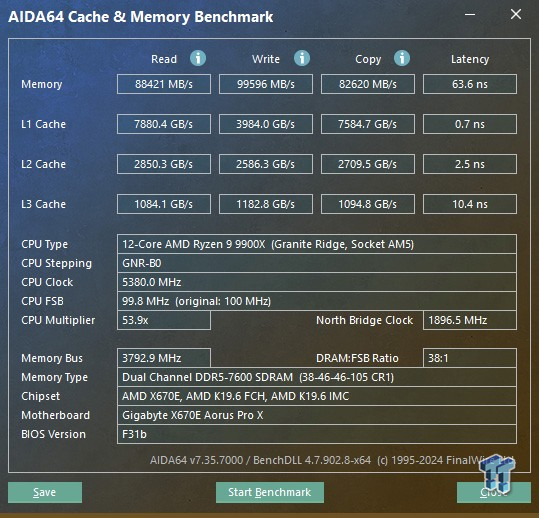
Memory bandwidth landed at 88K, 99K, and 82K, all legitimate performance from the 9900X. Latency, too, stayed rather low at 63ns.
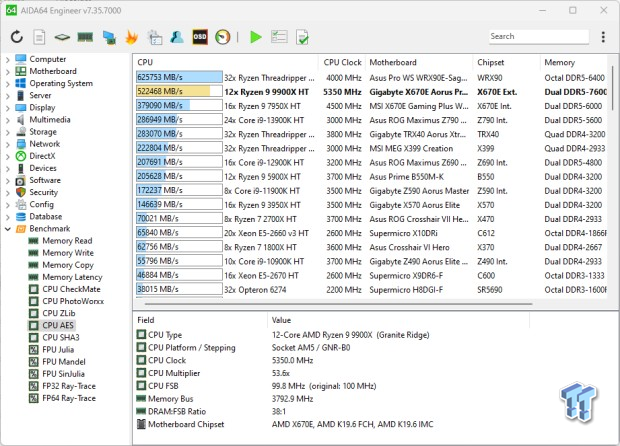
9900X was a beast in AES, just like the 9950X, scoring an amazing 522K points in this workload.
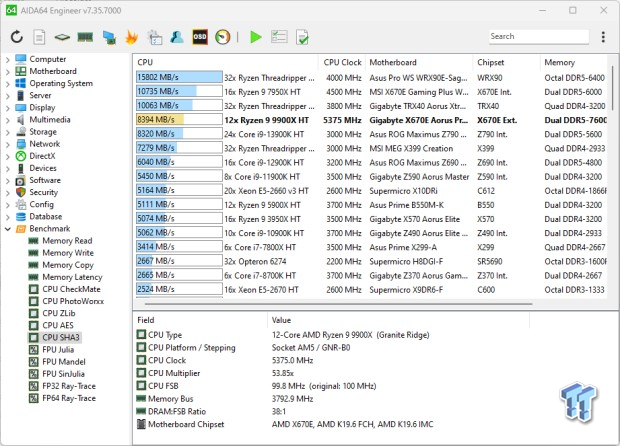
SHA3 touched 8394.
PCMark and 3DMark
PCMark
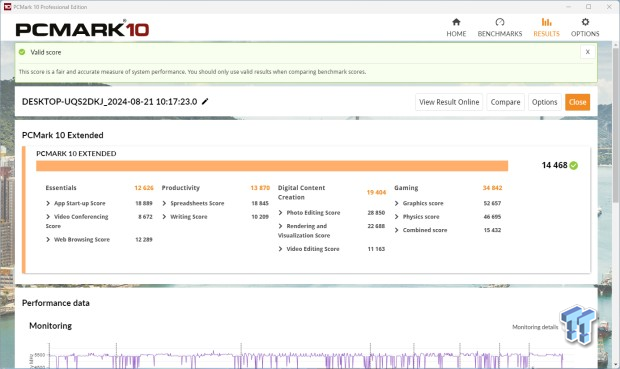
Running PCMark extended, we did grab 14468 with the 9900X. Gaming was the strongest workload, followed by Content Creation.
3DMark
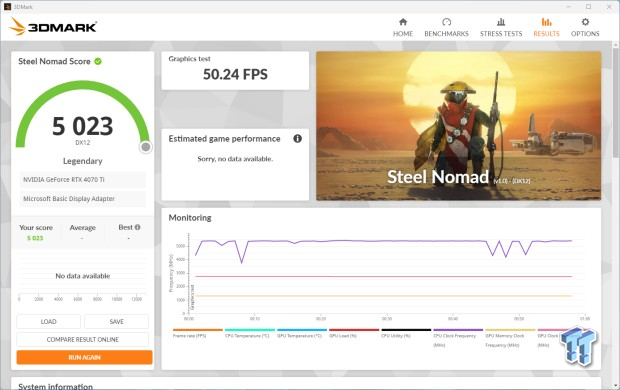
Steel Nomad gave us solid performance with the 9900X and our 4070 Ti. We picked up 5023 points, a solid 50 FPS average, and a Legendary rating.
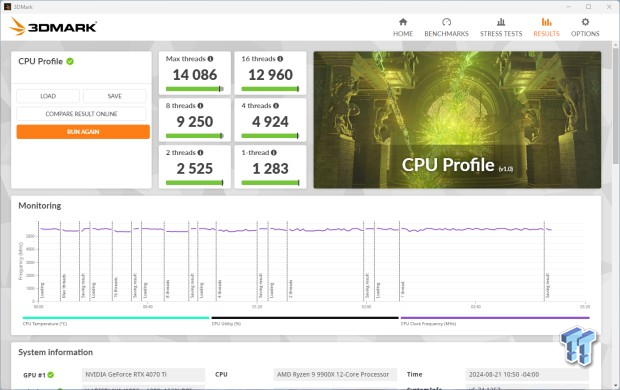
CPU Profile landed us a solid 1283 single core score in CPU Profile, moving out to four threads; we picked up 4924, wrapping up testing with a sixteen thread score at 12960 and maxed out at 14086.
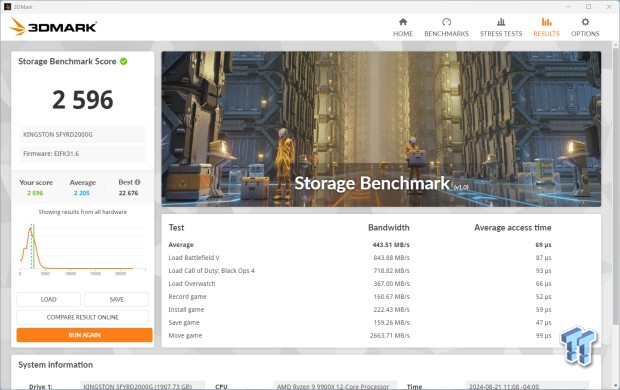
Storage landed at 2596 with a 443MB/s bandwidth.
Gaming Benchmarks
Cyberpunk 2077
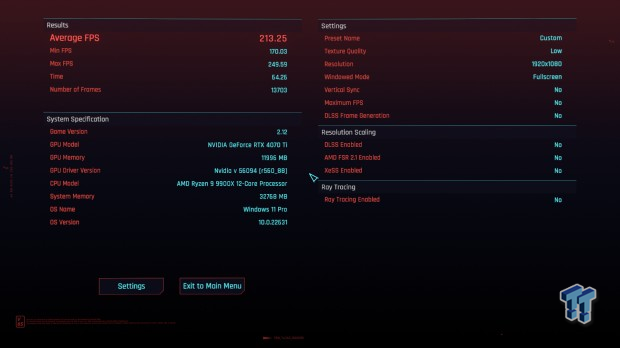
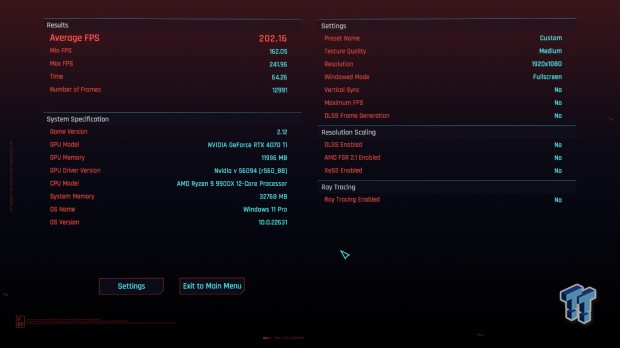
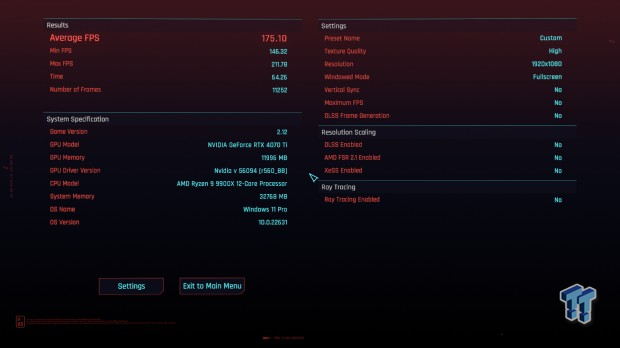
CyberPunk 2077 was tested with our RTX 4070 Ti using the game's built-in presets. We averaged 213 FPS at low settings, while medium and high presets landed at 202 FPS and 175 FPS, respectively.
Forza Motorsport
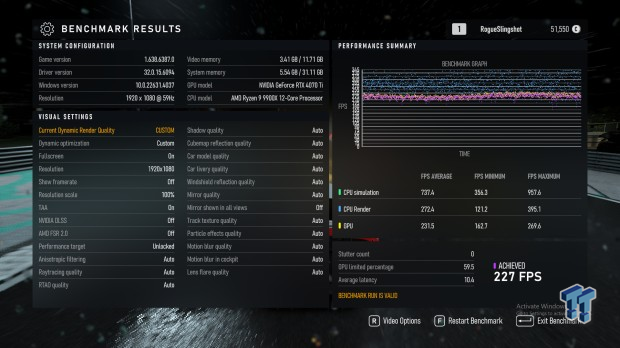
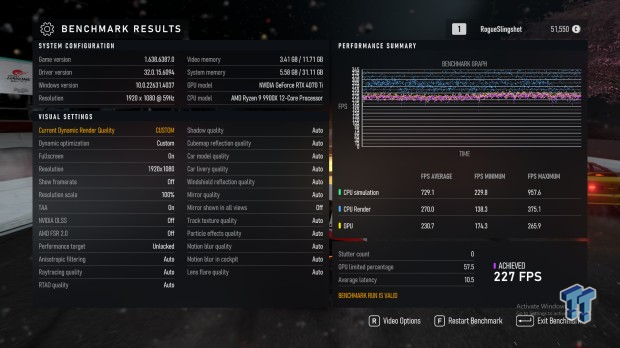
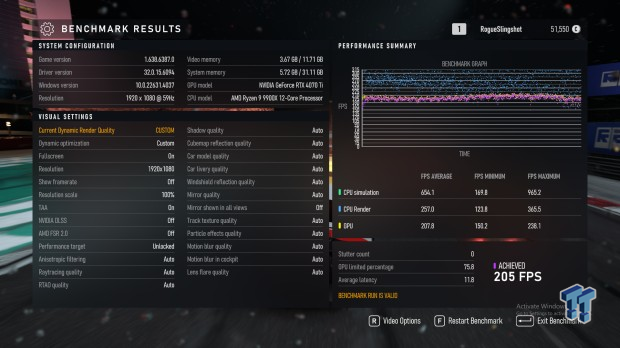
Forza Motorsport is again tested at 1080p, using the game's built-in presets. The low preset starts things off with a 227 FPS average. Medium follows right behind with an identical 227 FPS score and high lands at 205 FPS.
Ashes of the Singularity
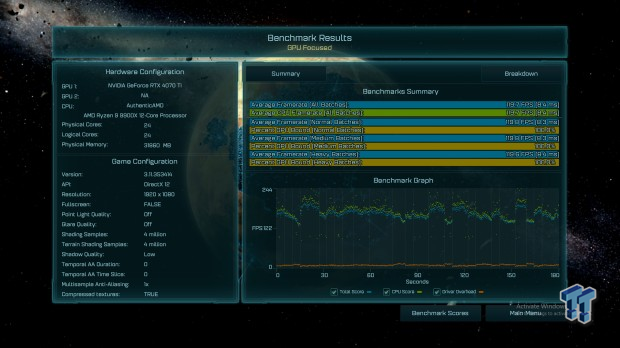
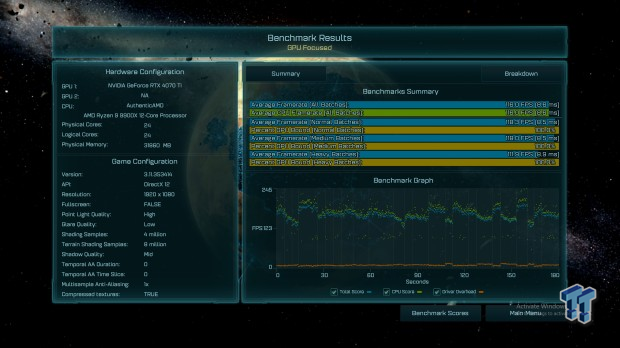
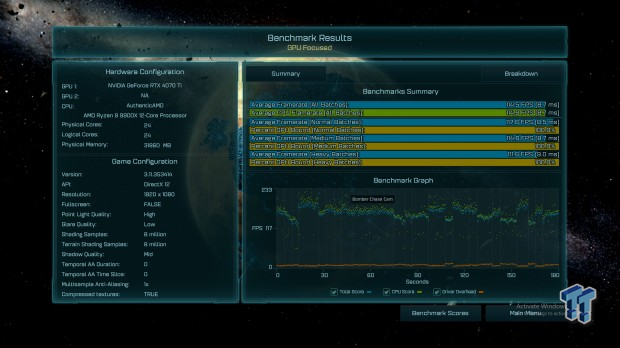
Ashes ran pretty even on the 9900X and 4070 Ti combo through testing, top to bottom, losing just 5 FPS from low to high presets. The low preset came in at 119 FPS, while the high preset finished testing at 114 FPS.
Charts/Comparisons and Final Thoughts
Charts/Comparisons and Final Thoughts
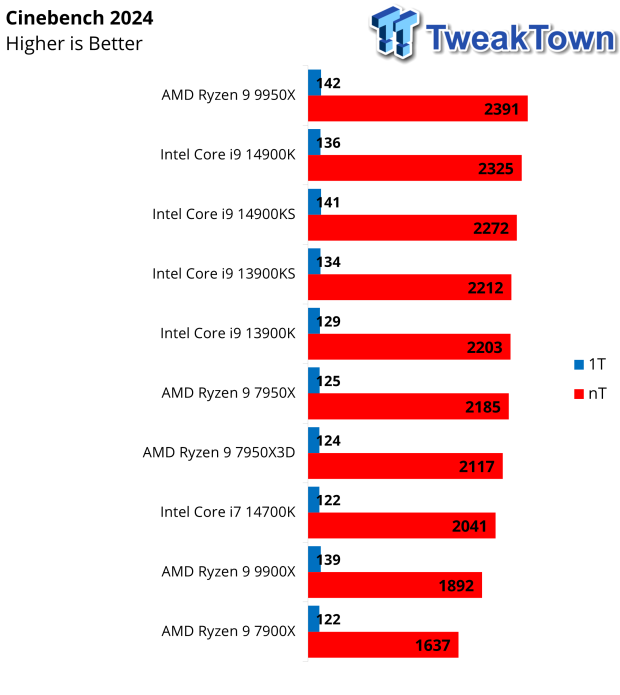
We have charts comparing the 9900X to the last few Intel flagship offerings, the last Gen 7950X and 7950X3D, and the 7900X it supersedes. Starting with R24, the 9900X lands right behind the 14700K, though it does have a higher single-core score of 139. We also note a solid 200-point uptick over the 7900X in multi-thread.
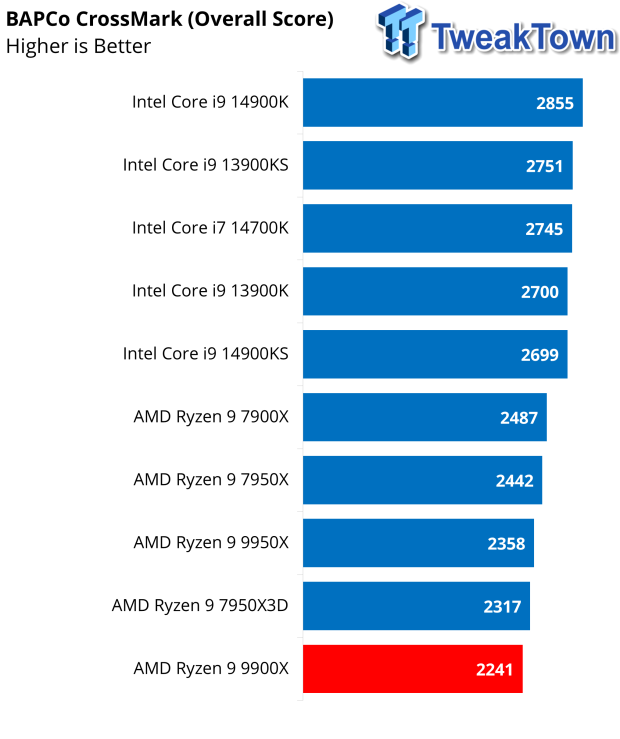
Like the 9950X, the 9900X has some performance quirks with Crossmark. It lands at the bottom of the charts with a score of just 2241 overall, which is about 200 points shy of the 7900X. This could easily be the system setup, including the NVMe, as it's an overall system benchmark and doesn't focus on the CPU alone.
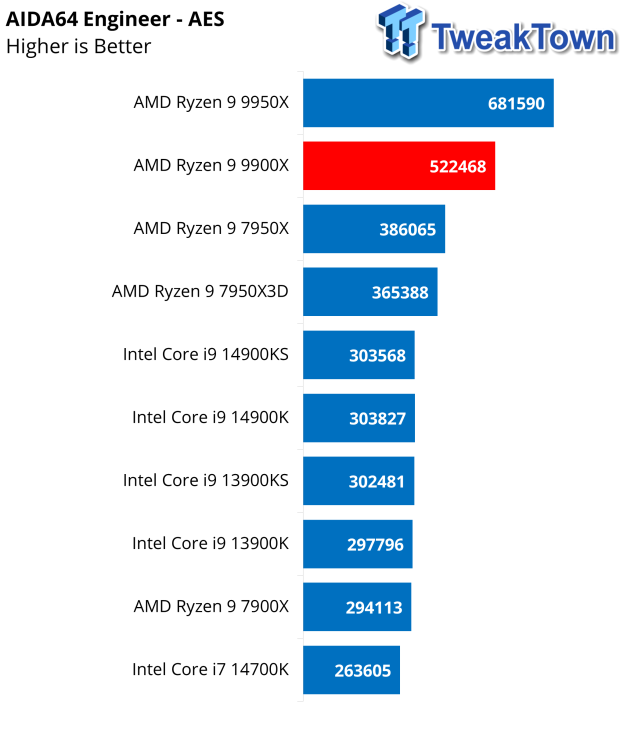
AIDA64 AES and SHA3 comparisons show both Zen 5 CPU offerings with massive performance bonuses for these workloads. The 9900X landed 522K for AES, nearly double the performance of the 7900X, which landed a touch over 294K.
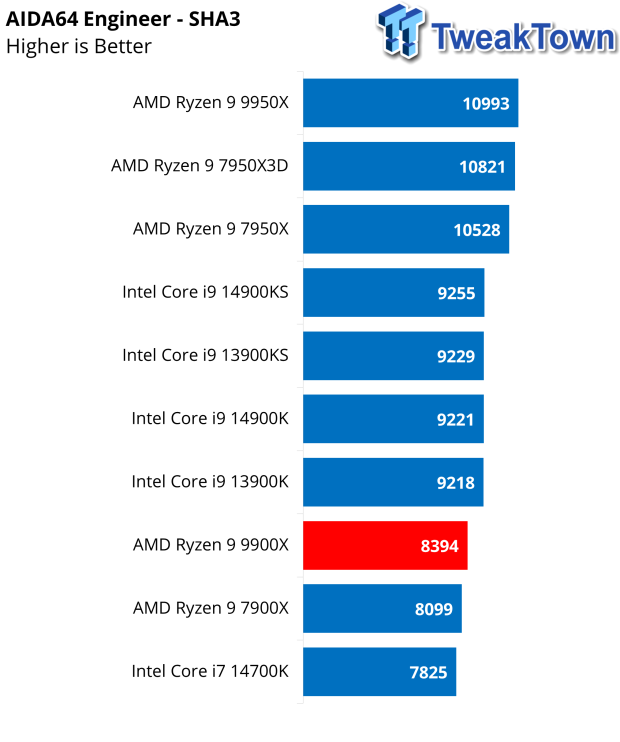
SHA3 mixed things up a bit more. The 9900X landed in the middle of the charts with a score of 8394, a touch better than the 14700K and nearly 300 points better than the 7900X.
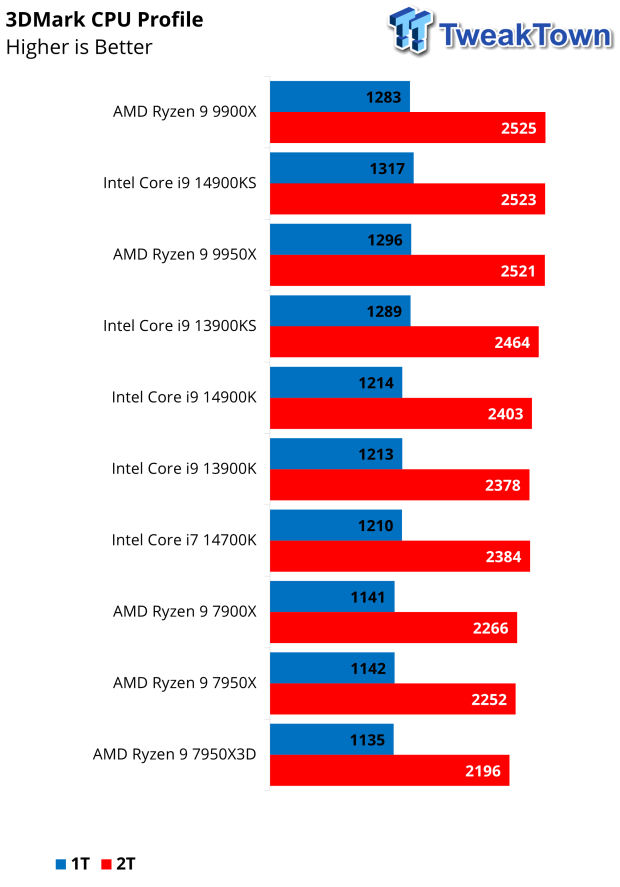
In the CPU Profile, the 9900X did land at the top of our one- and two-thread charts by just two points over the 14900KS. As for the 7900X, the 9900X is quite a bit better in CPU-heavy tasks, enjoying a solid 100-point advantage in single thread and nearly 300 points with two cores.
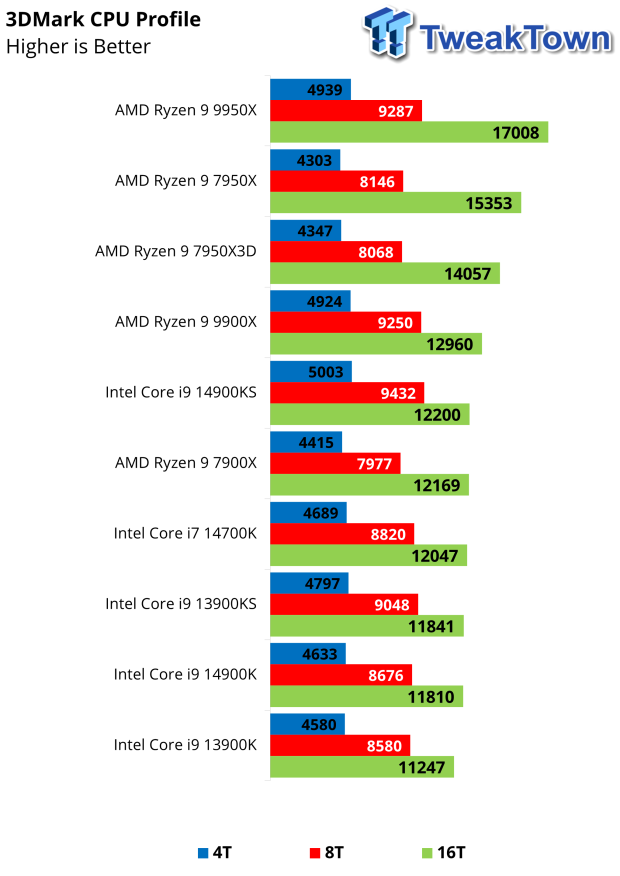
Four, eight, and sixteen threads open up the 9900X a bit more. With a peak score of 12960, it ends up about 900 points faster than the 14700K. With these higher threaded workloads, the 9900X lands over 700 points better than the 7900X.
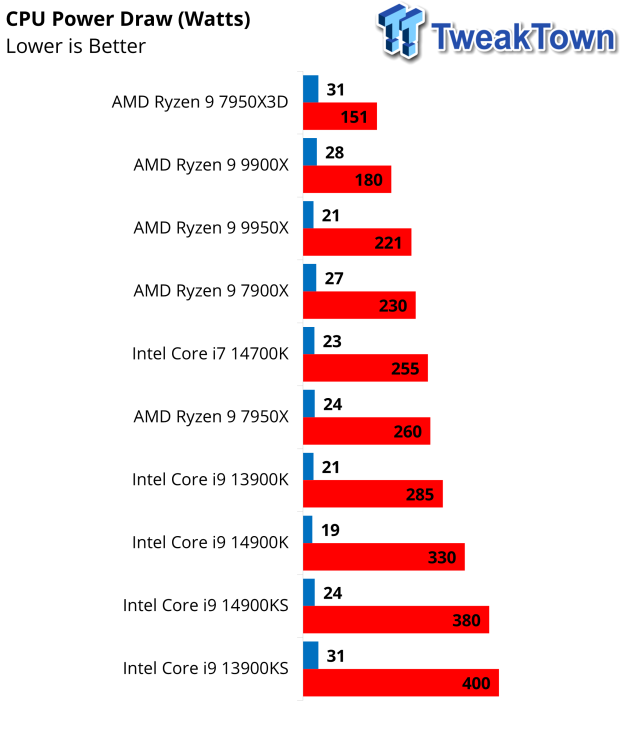
Power draw is much improved across all Zen 5 SKUs; the 9900X pulled just 180W during our Cinebench 2024 run compared to the 14700K, which needed nearly 40 watts more. In addition, the 9900X shows remarkable gains in efficiency, pulling almost 50 watts less than the 7900X.
Final Thoughts
Like the 9950X, we spent a good amount of time testing the 9900X, and while I don't feel it has the same performance jump as we saw when moving from the 5000 series to Zen 4, the 9900x and Zen 5 offer tremendous improvements in power consumption along with a modest bump in performance across CPU heavy workloads. Gaming isn't going to be the prowess of this twelve-core behemoth. As we stated, our resident GPU editor has already crowned that honor, but even in our initial testing with Cinebench and CPU Profile, two of my first workloads ran, and the 9900X came out swinging.
Getting into benchmarks, there wasn't a single workload where we didn't receive at least a modest performance boost from the 9900X, especially when looking at the 7900X. Intel is another animal altogether, getting things done with higher clock speeds, something AMD hasn't quite mastered to date. That said, we did have hiccups with Crossmark, a full system benchmark that we can't put much weight on because of the changing test systems, while on the flip side, we managed excellent scores in PCMark Extended, picking up 14468 points and with our 4070 Ti showed solid gaming performance. To that point, Steel Nomad picked up a Legendary score for our hardware configuration, scoring 5023 points with a 50 FPS average.
As for gaming, we did set up our test system with an RTX 4070 Ti we were able to get our hands on, and with that, we managed some solid performance in Cyberpunk 2077, reaching upwards of 200+ FPS in both low and medium presets tested at 1080p while high even managed 175 FPS without using DLSS. Forza Motorsport was similar, where we noted low and medium presets didn't stress our system, with both scenarios picking up the same 227 FPS. Ashes of the Singularity had a similar story, starting at 119 FPS with the low preset; we didn't lose too much performance, moving to medium or high, ending our testing at 114 FPS.
The pricing of the 9900X isn't bad either, though we have noted others saying it's a bit spendy. This CPU launches $50 cheaper at $499 than the 7900X did two years ago at $549. That's certainly a plus in my book.

